Cabbage Companion Plants: 20 Plants You Should Grow Nearby
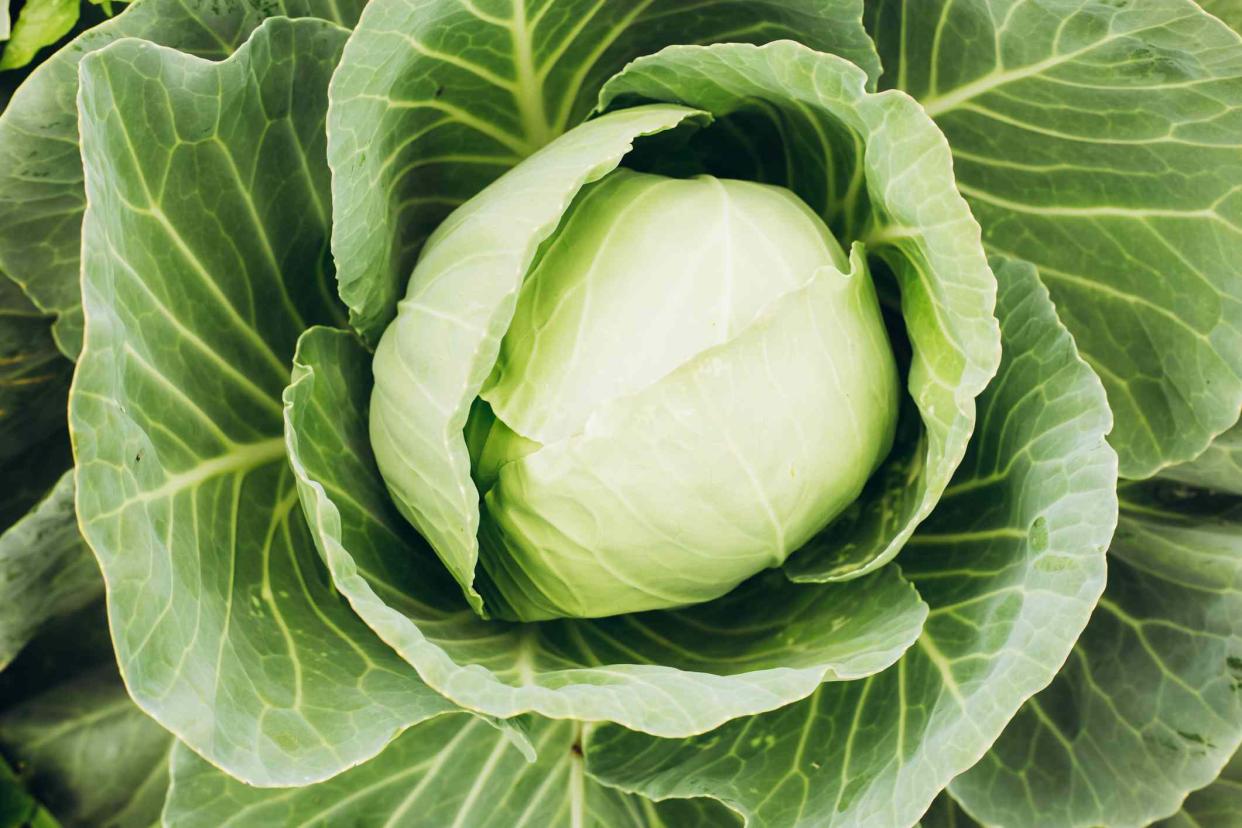
Olena Ruban/Getty Images
Cabbage (Brassica oleracea) is a cool-season vegetable that is relatively easy plant to grow if you add companion plants alongside your crop. Cabbage is a popular food for humans—and among common pests, too, like slugs, snails, cabbage worms, rabbits, and deer. One great way to keep cabbageworms and other pests away from plants is companion planting.
In fact, pest control is just one reason for carefully selecting certain plants to be cabbage companion plants. We round up 20 great companion plants that will support your cabbage's growth by deterring pests.
Learn about 20 cabbage companion plants that you can grow next door for a stronger crop, as well as examples of plants you should avoid growing nearby.
What Is a Companion Plant?
A companion plant is one that is compatible with another plant due to the benefits it brings. For example, it may draw pollinators, aid in pest or weed control, improve the soil, and provide shade or support.
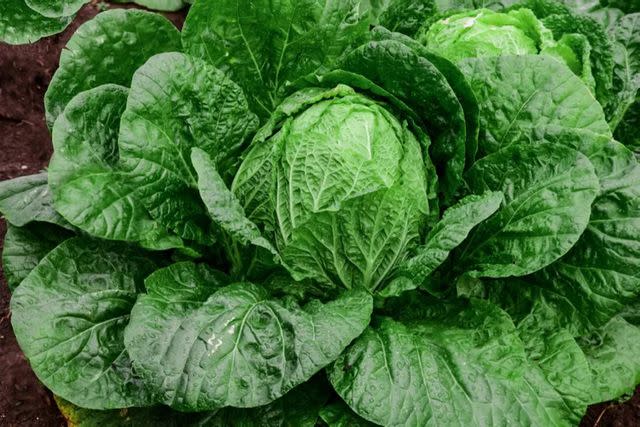
The Spruce / K. Dave
Best Cabbage Companion Plants
Plants That Positively Benefit Cabbage
An example of a cabbage companion is the carrot (Daucus carota). Carrots are compatible with cabbage because, like the latter, it is a cool-season vegetable. Cabbage and carrots share sunlight, water, and soil preferences.
Moreover, carrots and cabbage are attacked by different pests. Since carrot foliage does not take up much space and the vegetable grows underground, this works well with cabbage in a small space.
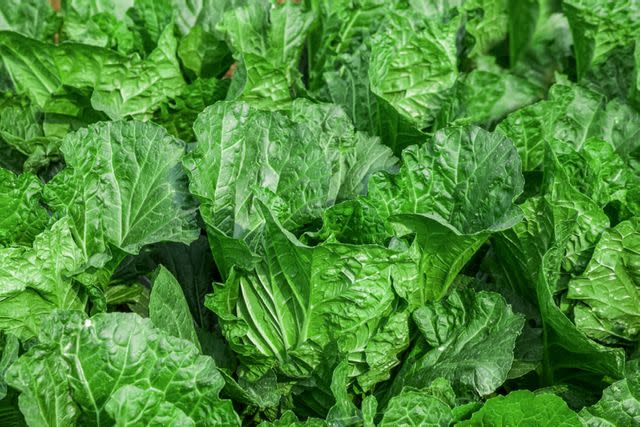
The Spruce / K. Dave
Draw Insects That Attack Harmful Ones
Examples of plants that attract good insects (to attack bad ones) are:
Yarrow
White clover
Buckwheat
Yarrow (Achillea millefolium) not only offers a floral display, but it also attracts parasitic wasps. These wasps lay their eggs in cabbage butterfly caterpillars, thereby killing the pests before they can eat your cabbage.
Another plant that draws parasitic wasps is white clover (Trifolium repens). Clover is beneficial to the growth of your lawn as well.
A third example is buckwheat (Fagopyrum esculentum), which can be used as a cover crop.
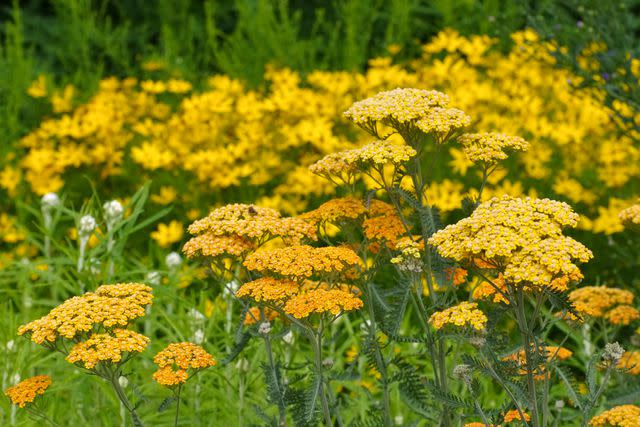
Plants That Repel Cabbage Worms
But there are far more choices in plants that repel cabbage worms through their smell:
Celery (Apium graveolens): aromatic vegetable
Onion (Allium cepa): strongly-scented bulb used as a flavoring agent
Garlic (Allium sativum): strongly-scented bulb used as a flavoring agent
Shallot (Allium cepa var. aggregatum): also known as a "multiplier onion"; another strongly-scented bulb used as a flavoring agent
Flowering onions (Allium spp.): If you want the benefit offered by alliums in repelling cabbage worms but also the attractiveness of a plant valued for its flowers, grow one of the many "flowering onions."
Chamomile (Matricaria recutita): herb with daisy-like flowers and a strong smell
Cilantro (Coriandrum sativum): the seeds are referred to as "coriander"; very strong-smelling herb
Marigold (Tagetes spp.): strongly-scented flower; even humans generally dislike the smell
Nasturtium (Tropaeolum spp.): scent milder than that of marigold, but leaf does give off a peppery smell that repels cabbage worms
Thyme (Thymus spp.): choose species and cultivar to match your needs (some more common as herbs for flavoring, others as ground covers)
Hyssop (Agastache spp.): fragrant herb often grown for its flowers
Rosemary (Salvia rosmarinus): fragrant herb
Peppermint (Mentha x piperita): fragrant herb
Spearmint (Mentha spicata): fragrant herb
Sage (Salvia officinalis): fragrant herb
Oregano (Origanum vulgare): fragrant herb
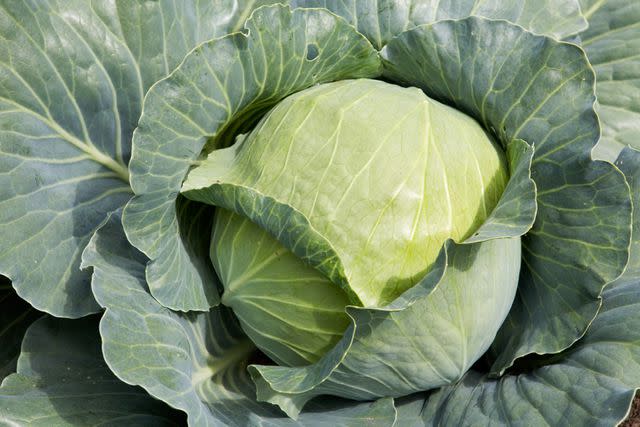
Visual Field/Getty Images
Worst Cabbage Companion Plants
The worst cabbage companion plants are plants that grow big enough to cast excessive shade on cabbage, thereby depriving it of necessary sunlight. These include:
Hardshell gourds (Lagenaria spp.)
Pole beans (Phaseolus vulgaris cultivars)
Cinderella pumpkins (Cucurbita maxima)
Squash (Cucurbita moschata)
Tomatoes (Solanum lycopersicum)
Benefits of Having Cabbage Companion Plants
A companion plant must be compatible with cabbage in several ways. The two plants should have the same growing requirements and not crowd each other out. They should share similar seasons of growth (in this case, cool season), sunlight and watering requirements, and soil preferences.
Deter Pests by Drawing Competitive Insects
The two plants are not attacked by the same pests, which would invite an infestation. Cabbage benefits when it is planted next to a crop that does not compete with it for the same nutrients in the soil.
A beneficial insect for cabbage attacks other insects that will harm your cabbage. Any insect that attacks these pests is obviously beneficial to you and is worth trying to draw to your garden via smart plant selection.
Give Off Smells That Deter Pests
Fortunately, you do not have to rely on beneficial insects, alone. Some plants give off a smell that repels these pests. Such plants are commonly called "aromatic" or "fragrant" because they have strong scents generally favored by humans, but pests dislike these scents and are deterred by them.
Read Next: 11 Best Strawberry Companion Plants (and What Not to Plant Nearby)
Read the original article on The Spruce.

